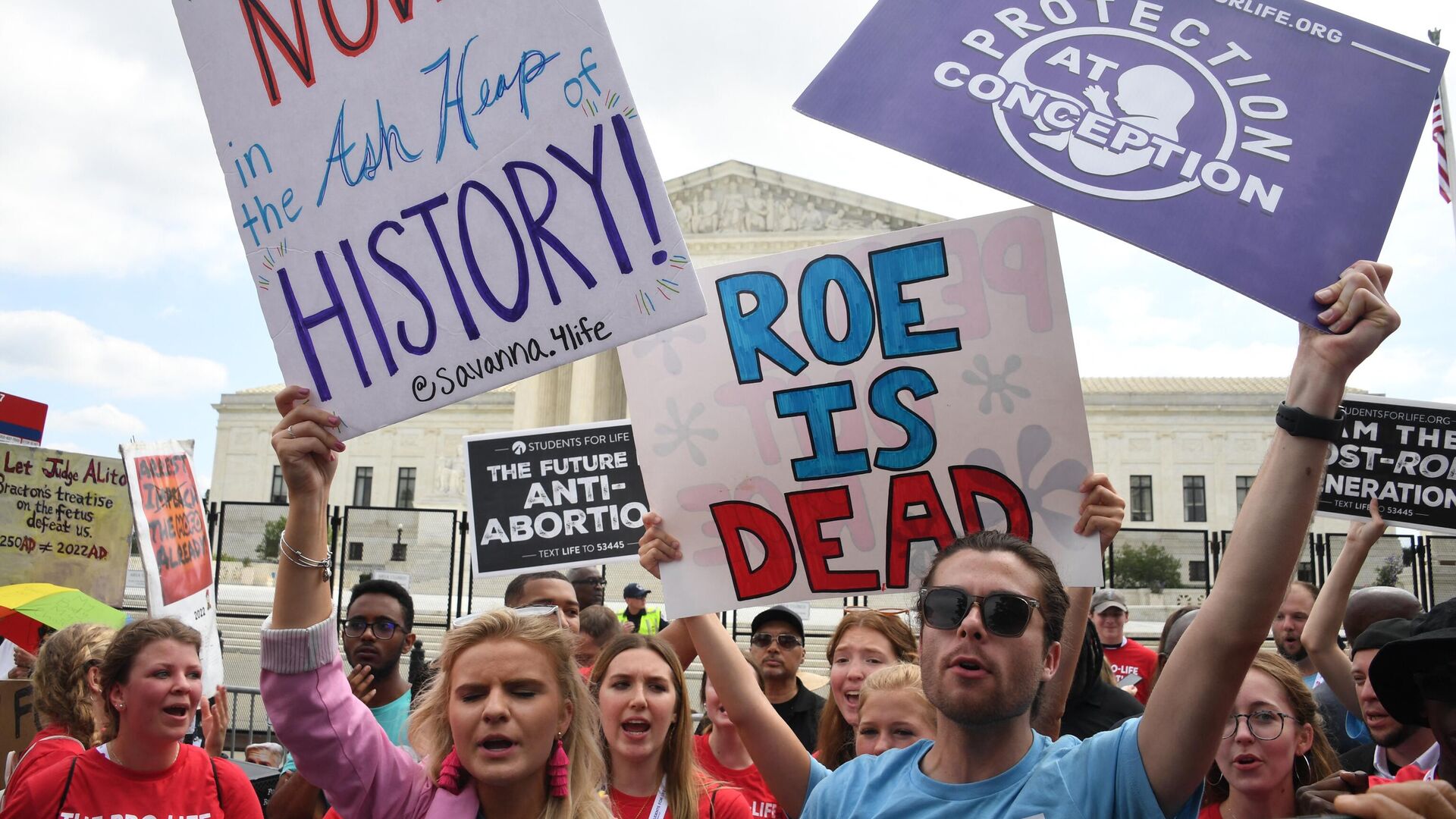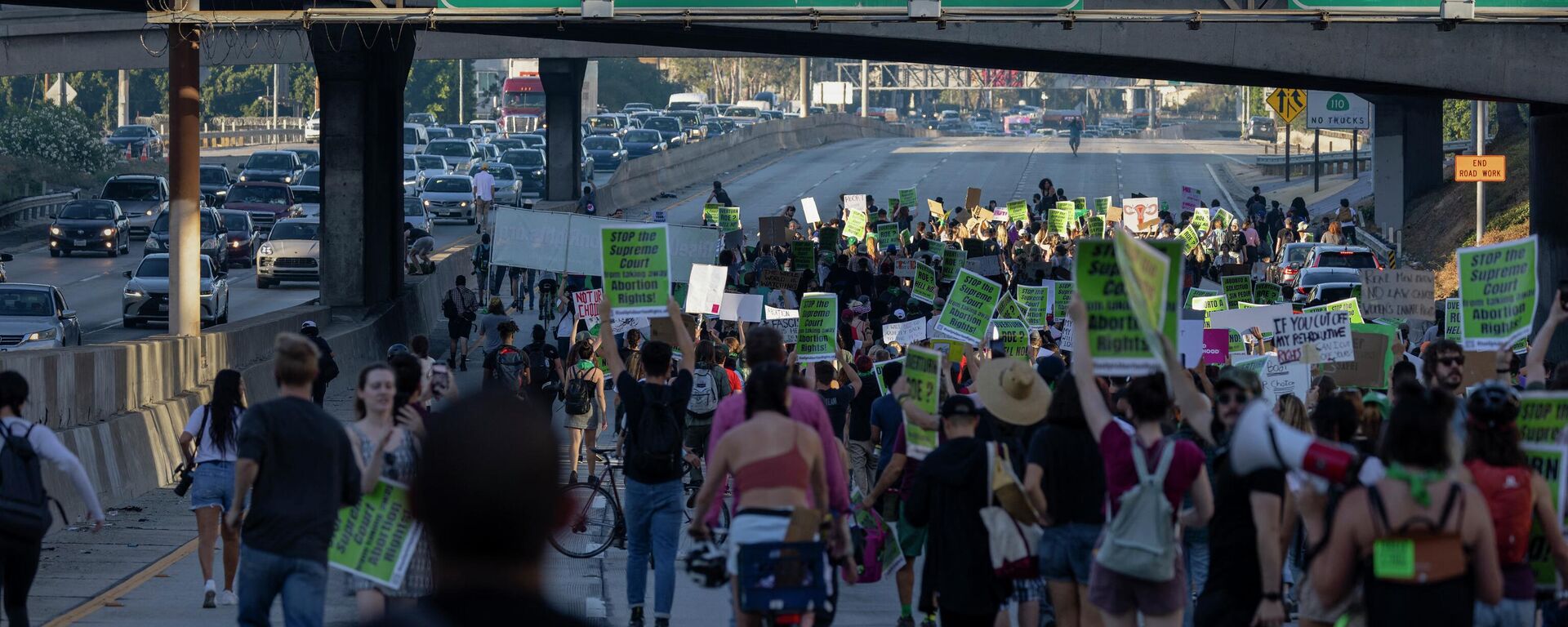Supreme Court Decision to Reverse Roe v. Wade to Galvanize Democrat Base Ahead of Midterms - Experts
18:29 GMT 28.06.2022 (Updated: 18:31 GMT 28.06.2022)

© AFP 2023 / OLIVIER DOULIERY
Subscribe
MOSCOW (Sputnik), Kirill Krasilnikov - The US Supreme Court's overturning of the 1973 Roe v. Wade landmark decision that protected the constitutional right to an abortion may help to energize the Democrat base ahead of the mid-term elections, creating some difficulty for the Republicans, experts said.
Last week, the predominantly conservative US Supreme Court overruled the precedent established by the Roe v. Wade and decided that states may regulate the practice of abortion. The Roe v. Wade decision upheld pregnant women’s right to seek an abortion without government restrictions. A decision in the 1992 case of Planned Parenthood v. Casey largely upheld the Roe ruling.
Effect on Midterms
In November, US citizens will go to the polls in what will be the first midterm election of the Joe Biden administration as well as a referendum of sorts on the current US president's performance. The Republicans have been projected to win back the House of Representatives and the Senate as well, as the public has been increasingly frustrated by the issues such as inflation, crime, education and jobs. The recent ruling, however, could potentially give the democrats a shot in the arm by generating excitement among their voters.
"It will certainly galvanize the Democrats' base, for sure, it will help them to raise campaign funds and it may - perhaps - make some races more difficult for Republicans, especially in the suburbs among women voters," Robert Singh, a professor of politics at Birkbeck, University of London, said, adding that most voters will still be focused on other issues and he still expects the Republicans to win both houses of the Congress.
This sentiment was echoed by Ziad Munson, a sociology professor and the chair of the department of sociology and anthropology at Lehigh University in Pennsylvania, who also warned that the effect of the decision can be overstated.
"A consistent finding in political science over the last several decades is that the abortion issue, while a potent ideological symbol, seldom is a key policy issue for voters when they cast their votes," Munson explained.
Andrew Wroe, a senior lecturer in American politics at the University of Kent, agreed as well that the issue should help the Democrats, citing the effectiveness of the Republican use of cultural issues for rallying their base.
"The Democratic Party has been less successful in prosecuting the Culture Wars, but this is its great opportunity. Whether it will use it well is a different question, however," Wroe suggested.
At the same time, Christopher Kaczor, the chair of the philosophy department at Loyola Marymount University, is doubtful about the abortion issue having an impact on the US political landscape and helping Democrats to excite their voters.
"I expect that the very small minority of people for whom abortion is the key issue, on both sides, will be energized by this decision, but for most people other political and economic issues will remain more important," Kaczor stated.
New Wave of Protests?
The Supreme Court's decision has triggered a strong reaction on both sides of the issue in the United States, with hundreds of protesters, pro-life and pro-choice, gathering outside the Supreme Court last week following the decision. After the ruling, protests broke out in various US cities, showing a possibility of a nationwide backlash.
"People are angry, distraught, and ready to mobilise. It is difficult to say precisely how long the protests will persist, but it is likely to be some considerable time, given the magnitude of the policy change and the direct and indirect effects it will have on millions of people's lives," Wroe said.
Meanwhile, other experts expressed skepticism regarding the possibility of nationwide protests, including Munson, who drew attention to the fact that "the conservative majority tested for this possibility when they agreed not to stay the implementation of the Texas S.B. 8 law [also known as the Texas Heartbeat Act that bans abortion after detection of an unborn child's heartbeat] earlier this year."
"Allowing that law to go into effect was the Court's political trial balloon, and it showed that widespread outrage quickly quieted down after just a few days. The outrage following the formal overturning of Roe v. Wade will last longer, but it is not likely to lead to large-scale consequential protest activity," the sociologist said.
Who Judges the Justices?
Over the years, the role of courts in the US social and political life has greatly increased, with the Supreme Court becoming the final arbiter on many hot-button issues, such as same-sex marriage, gun control and abortion. This has been a prominent talking point among conservatives, who have been claiming that this practice undermines the country's constitutional principles, while liberals have been appealing to the notion of the courts standing up for human rights as well as drawing attention to the conservative movement's efforts to train and promote judges who share its principles.
"Both liberals and conservatives have always been supportive of judicial activism, they just want the judiciary to be activist in promoting the issues or outcomes that their side prefers. This despite the fact that conservatives have used 'judicial activism' as a talking point for some time," Munson pointed out.
Kaczor, for his part, drew a distinction between the original Roe decision and the Dobbs v. Jackson Women's Health Organization, insisting that the latter actually corrects a case of judicial activism.
"The Dobbs decision is not accurately portrayed as a case of judicial activism, but rather as the reversal of judicial activism. It was Roe that established a constitutional right for abortion that had no basis in the text, history, or structure of the constitution. The decision of Dobbs undoes this judicial activism," he stated.
Nevertheless, the ruling by the current Supreme Court, which has three justices picked up by former President Donald Trump from a list compiled by the conservative legal organization Federalist Society, is likely to have the Democrats sour on the Supreme Court.
"Democrats are increasingly likely to start talking about illegitimate policy making by the Supreme Court. They will start to complain about judicial activism. But, as noted above, they can use these arguments to mobilize their base and to argue for urgency of electing more Democrats to the Senate, which of course must ratify presidential appointments to the Court," Wroe said, adding that the Democrats can also "begin to legitimately argue that the Senate has an in-built Republican advantage that needs to be addressed via constitutional change."
According to Singh, any Democratic nominee for the 2024 presidential race will face the pressure to commit to enlarging and reforming the Supreme Court.
"Whether that happens, though, is another matter. I doubt the Democrats will have sufficient seats in the Senate to overcome a GOP filibuster of court reform proposals. But the fact that the conservatives number six now on the Court sets up an on-going problem for Democrats, and more conflict to come," Singh concluded.

